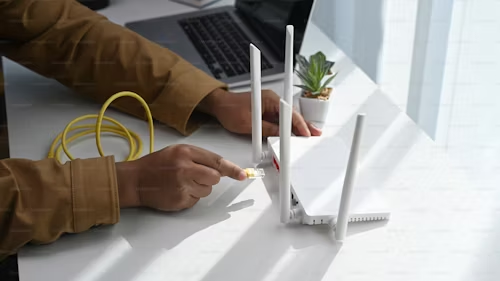
We have all heard of broadband – for some people, having access to the internet is just as important as having running water or electricity. But not all broadband speeds are equal. Just because you pay for a 30 megabits per second (Mbps) connection, it doesn’t necessarily mean you’ll get that speed all the time.
There can be many factors that affect your internet speed, even if you have Wi-Fi. This is why some users choose fiber internet connections; they offer faster speeds and more reliable connections than those delivered via traditional copper telephone wires. Working out whether regular copper-based broadband or fiber optic broadband is right for you might seem difficult – but fear not! We’re here to make things easier.
Understanding the Broadband Connection
Broadband Internet provides high-speed internet. It is much faster than 3G and 4G internet old dial-up connections. This standard type of internet connection worldwide allows users to use applications like YouTube and Skype. DSL broadband, delivered over copper wires, splits the line into two frequencies – one for data and one for voice. Traditional DSL speeds range from 768 kbps to 7 Mbps, but for the best speeds, you should be within 2 miles of the telecom company’s headquarters or branch office.
This connection indicates fast internet and comes in different types, like DSL, cable modem, fiber, wireless, satellite, and powerline. The one you choose depends on where you live, whether in a city or the countryside, what other services you want with your internet (like phone or TV), how much it costs, and if it is even available in your area.
What is a Fiber Optic Connection?
Fiber optic broadband uses special cables of tiny glass fibers to send information quickly. Choosing a fiber connection means you get super-fast, reliable, and safe internet. The network connection is way speedier than regular wired or wireless internet. You can listen to music, share high-quality photos on social media, and do anything online faster. With fiber, streaming and downloading are lightning-fast.
These repeaters refresh the optical signal by changing it into an electrical one, managing it, and then sending it out again. Nowadays, fiber optic cables can handle signals as fast as 10 Gbps. Usually, the more data a fiber optic cable can handle, the pricier it gets.
Key Difference Between Fiber and Broadband Connection
Although numerous people are inclined toward fiber optic connection, many still need to be aware of their fundamental differences. Let’s explore how fiber internet connection differs from broadband connection.
● When deciding on internet service, the most crucial thing is reliability. Nowadays, broadband and fiber optic connections are dependable options for fast internet. Broadband is generally more reliable than fiber because local weather conditions may affect it and cause interruptions. Both types of connections are designed to be passive, meaning they don’t usually face interruptions, but when comparing the two, broadband tends to be a better choice for reliability.
● The fast internet is crucial for business tasks like video calls, meetings, presentations, and transferring big files. To meet these needs, companies look for high bandwidth. Broadband can slow down when numerous people use it at the same time. The reason is they all share the same internet connection. However, the company has a dedicated service with fiber optic internet, so the speed stays consistent. Users get the high bandwidth they need without slowdowns. Therefore, fiber optic internet offers more bandwidth compared to broadband.
● If you care about keeping your information safe and private, choosing a connection that’s harder for others to hack into is best. In this situation, a fiber connection is the safer option because you have a separate line dedicated to you. This is especially crucial for businesses where keeping sensitive information private is significant.
● Compared to broadband, fiber internet can be more costly. However, efforts are underway to make fiber connections more affordable for everyone. Typically, individuals might find it too expensive to have fiber at home, but broadband is more budget-friendly. On the other hand, big companies often choose a fiber connection because they need fast internet for large-scale operations and can easily afford it for their premises.
Conclusion
In sum, fiber internet is the top-notch technology for getting online nowadays. It’s way better than any other type of broadband out there. If you’re into streaming, gaming, or video calls, having a faster connection offers a better online experience. But if speed is not a significant deal for you and you only need the basics, regular broadband might do the trick. However, if you need more than just a few megabits per second, fiber broadband is the way to go.